Released: 3rd March 1997
Writers: Spice Girls / Andy Watkins / Paul Wilson
Peak position: #1
Chart run: 1-1-1-2-6-15-19-25-38-47-53-56-40-58-66
For most acts, the fourth single from a million-selling album would be a case of diminishing returns. But the Spice Girls weren’t like other groups. Who Do You Think You Are didn’t just consolidate their success; it elevated them as a cultural phenomenon thanks in no small part to a memorable Brit Awards performance.

Though it’s difficult – if not impossible – to pinpoint a specific moment when the Spice Girls turned from a hugely successful pop act into an all-consuming brand, the few months between 2 Become 1 and Mama/Who Do You Think You Are marked a reasonably clear shift. There was a noticeable increase in the group’s sponsorship presence, as they signed numerous deals (more than 20) to endorse products from soft drinks and crisps to deodorant and Polaroid cameras throughout 1997. Alongside that, a range of Spice Girls merchandise was also launched. Their presence was no longer confined to the charts, and the unprecedented commercialisation did extend to the group’s music as Mama/Who Do You Think You Are adopted the same approach. At least it was all for a good cause.

With everyone scrambling for a piece of the Spice Girls, their association with Comic Relief to provide the official single for the 1997 event represented a massive coup for the charity. It also marked a slightly different endeavour because, unlike most other years, neither song was recorded with Comic Relief in mind. This – the fourth and final release from the Spice campaign – was likely to happen in much the same way regardless. Furthermore, even the exposure that came along with a high-profile charity single doesn’t feel any more than Mama/Who Do You Think You Are would have garnered anyway. It’s not that the group didn’t get anything in return, though. Both tracks were shortened from the album versions already owned by well over a million people but otherwise essentially unchanged. Thus, Comic Relief created a reason for people to buy them again in greater quantities than they might otherwise have, more or less guaranteeing what would be a record-breaking fourth #1 for the Spice Girls. Conveniently, the release date also fell in time for Mama to coincide with Mother’s Day. However, with all proceeds going to charity, that was enough to deflect any criticisms that might otherwise be aimed at the marketing strategy or songs themselves.
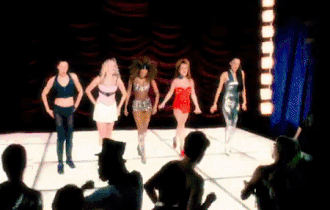
Although the Spice Girls became ubiquitous with the resurgence of bubblegum pop, the Spice album is rarely as vigorously brash as the singles released from it suggested. Who Do You Think You Are certainly helped swing the campaign to give that impression, though. The track was co-written and produced by Absolute (Andy Watkins and Paul Wilson) following several – unsuccessful – sessions where they struggled to form a cohesive creative partnership with the Spice Girls. So, the duo changed their approach; rather than prepare backing tracks and suggestions based on what they thought the group wanted, they started from scratch and let the Spice Girls take the lead. Thus, Who Do You Think You Are emerged out of the desire to create something fun and uptempo. They weren’t just writing a pop song; the group were thinking about visual aspects – a dance routine, possible video treatments – all at the same time. It marked a turning point for Absolute, who now understood how the Spice Girls worked. From there, the duo became integral to Spice and Spiceworld.
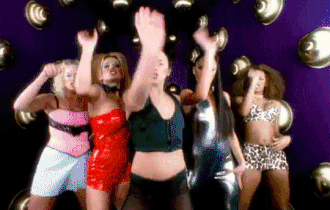
Who Do You Think You Are takes its lead from ‘70s disco with funky brass stabs woven into the production, while the thumping beat situates it inherently within the Europop/dance of the ‘90s. Blending the two styles ensures the track has contemporary appeal while evoking a sense of familiarity. As choices for charity singles go, this is certainly the one most accessible to as wide an audience as possible. It streamlines the chaos of Wannabe into something more orderly and stylised (a rowdy exchange takes place during the instrumental breakdown but is very much pushed to the background at a barely audible volume). Indeed, of all the tracks released from Spice, this is arguably the most timeless beyond the immediate era in which it existed.

The song has its finger firmly on the pulse of – and perhaps even slightly precedes – the growing fascination with fame and overnight celebrity that intensified during the late ‘90s and early ‘00s. The Spice Girls weren’t exempt from that; their meteoric rise became a template for record labels to try and emulate (rarely well). However, they position themselves here as commentators, able to see through the facade (“The race is on to get out of the bottom, the top is high, so your roots are forgotten…”). The track doesn’t downplay aspiration, for that would contradict a big part of the group’s mantra, which was all about pushing boundaries and defying convention. However, the message instead is one about maintaining perspective: “You have got to reach on up, never lose your soul, you have got to reach on up, never lose control”. Fortuitously, pairing Who Do You Think You Are with Mama – a ballad where the Spice Girls sentimentally reflect on their upbringings – as a double-A side perfectly demonstrates that moral.
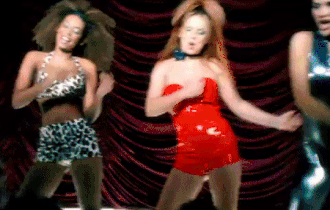
Splitting the verses back and forth ensures the group’s individuality remains present. Geri Halliwell is suitably unsubtle: “Giving is good as long as you’re getting…” while Emma Bunton’s sweetness takes on a playfully sardonic edge: “What’s driving you is ambition I’m betting”. The dynamic of the Spice Girls’ personalities within their music was well-established by now. Thus, the contrast between Victoria Beckham’s coolly acerbic: “Your trumpet’s blowing for far too long…” and Melanie B’s spirited: “Climbing the snake up the ladder, but you’re wrong” provides a particularly effective highlight during the second verse.
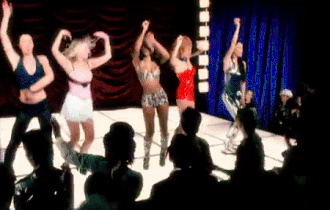
Though Who Do You Think You Are never betrays the core appeal of the Spice Girls as a five-piece collective, it’s also a song that hinges – a little more significantly than before – on Melanie C’s contributions. Her pointed: “Do you THINK you A-ARE” forms the centrepiece of the pre-chorus: “I said-a who-o-o-o-o-o-o do you think you are…”) and oozes a confident swagger that is so perfectly apt for the take-down the song is delivering. Towards the end of the track, Melanie C becomes even more integral to Who Do You Think You Are as her: “Swing it, shake it, move it, make it, trust it, use it, prove it, GROOVE IT” ad-libs essentially become a refrain layered atop the final choruses as the main vocal line. Having Melanie C’s voice so prominent during the last 40 seconds might leave the impression that she dominates Who Do You Think You Are. However, while it’s true that this wouldn’t be the same track without her, all five members get an ample turn in the spotlight, nonetheless.
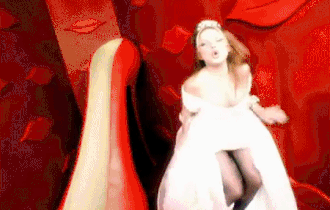
The chorus is composed with artful simplicity; it follows a rote pattern: “Swing it, shake it, move it, make it, who do you think you are? Trust it, use it, prove it, groove it, show me how good you are. Swing it, shake it, move it, make it, who do you think you are? Trust it, use it, prove it, groove it, show me how good you are” that instinctively rolls off the tongue without having to actively think about the words. This is one of the best manifestations of the universal inclusivity of the Spice Girls’ music. It’s perfect as a go-to party track in almost any context – from family-friendly discos to nightclub dancefloors – yet works just as well as a toe-tapping staple of commercial radio. Little surprise, then, that not only did Who Do You Think You Are top the airplay chart (Mama, by comparison, reached #15), but in 2021, it was confirmed to be the most-played Spice Girls song of the 21st century across TV and radio in the UK, ahead of Wannabe and Stop.

It’s entirely believable that sections of the visuals for Who Do You Think You Are were composed alongside the song itself because the music video presents a veritable jumble of ideas. Probably the most important in terms of the track’s identity is the group performing on a light-up stage to a crowd of revellers. The accompanying dance routine is the first that feels consciously designed to be copied. It is neither slick nor complicated – mainly consisting of pointing and flailing arms – but that’s precisely the point in helping designate Who Do You Think You Are as the Spice Girls song everyone can join in with simultaneously. Alongside those sequences, each member of the group appears in a room decorated – vaguely – to fit their individual style (although Melanie B’s looks suspiciously like a zoomed-in section of the stage with black fabric thrown on the floor because some of the light panels are visible at the edge of the shot).
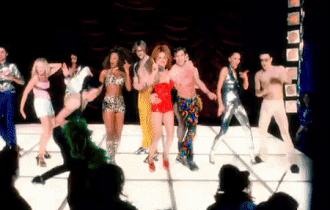
There’s a quirky Britpop eccentricity present throughout the video. A giant high heel is placed in one of the rooms, while another has a giant horse statue. Furthermore, a stream of extras are featured; some demonstrate tricks (one wears flaming gloves, another is a contact juggler) while the rest pose to the camera. Thanks to sped-up and flash-transition editing, it’s all given a further offbeat energy. Yet, while many of the visuals could feasibly have been conceived long before the Spice Girls launched, others are unmistakably derived from everything that happened after. In hindsight, Who Do You Think You Are is the first video where the group’s image is comprehensively portrayed – from the styling to how they behave on-screen – and each member knowingly plays into their roles. It’s that, ultimately, which ties the various strands together to create a sense of coherence where none otherwise exists.

A second video for Who Do You Think You Are was created specifically for Comic Relief. The broad concept is the same, reusing some sets and footage. However, the Spice Girls are instead joined by the Sugar Lumps, a fictional group based on – and stereotypically dressed as – the now-official nickname personas. Portrayed by Jennifer Saunders (Ginger), Dawn French (Posh), Lulu (Baby), Llewella Gideon (Scary) and Kathy Burke (Sporty), there’s a prelude showing them – minus Lulu – as schoolgirls rehearsing in a bedroom and debating which Spice Girl they want to be. The actual comedy value is debatable, but as a piece of observational satire, it’s probably not far off the reality of what was happening at the time, right down to a mix-up when Lulu and Dawn French both turn up dressed as Baby Spice, leaving the latter to change her outfit begrudgingly.

The Sugar Lumps subsequently attend a Spice Girls gig – entering the venue with a riff on the Wannabe video – and eventually crash the stage to perform alongside them, though bedlam inevitably ensues. Comedians and celebrities appearing in Comic Relief videos are a tradition, so Who Do You Think You Are isn’t particularly unique in that respect. However, the cameos do, at least, form part of the narrative – which isn’t always the case – and create a light-hearted tone that is maintained throughout. Nevertheless, having the Sugar Lumps version as an alternative is a smart decision because the comedy, though gently entertaining, is a superfluous novelty. Some charity songs are created for that purpose, but this isn’t one of them. Who Do You Think You Are is, first and foremost, a Spice Girls single rather than a Comic Relief one. The main video removes all traces of philanthropy so that it doesn’t factor into the track’s identity whatsoever.
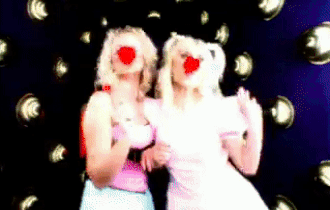
Yet, the defining legacy of Who Do You Think You Are didn’t come from either video; it occurred, instead, at the 1997 Brit Awards, where the Spice Girls performed the track. As the intro to Wannabe played, the group faced the back of stage before turning to descend a sloped walkway while singing miming the chorus. There was scarcely time to take in what was happening, but as the intro to Who Do You Think You Are started, there was Geri Halliwell in a Union Jack dress, black underwear and red platform boots. Overnight, it became the pop culture moment of the Spice campaign and remains the most enduring, recognisable image associated with the Spice Girls.

However, this performance isn’t iconic just because of Geri’s dress, though that’s undoubtedly the impression often given. It’s so memorable because it captures the essence of the Spice Girls and Spice Mania in its purest form. The group’s image had evolved from the crude styling of Wannabe, but their appearance at the Brits was still reasonably close to that. They were superstars but not yet celebrities, which is where the Stop the following year felt notably different. Moreover, the staging is simple yet effective. Who Do You Think You Are works better than any other single from Spice because the choreography allows the Spice Girls to fill the space as a group. Their individuality was always a strength, but even in small TV studios, it would sometimes seem like the camera was never quite sure who to focus on because so much was happening. There were no such compromises at The Brits; as they strutted down the stage in a V-formation led by Melanie C, the Spice Girls exuded star quality – together – and commanded the attention of everyone watching, whether in the venue or at home. It elevated the Spice Girls to a level of fame and recognition, which now transcended chart positions or sales.
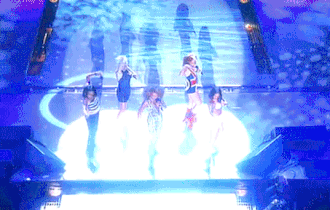
All things considered, it came as no surprise whatsoever that Mama/Who Do You Think You Are debuted at #1, where it remained for three weeks. In doing so, the Spice Girls set a record at the time as the first act in UK history to top the chart with their first four singles. First-week sales of 248,000 copies were equally impressive and well above the average at that point in 1997. Mama/Who Do You Think You Are sold 660,000 copies (since revised to 786,000 with streaming and downloads included), making it the 15th biggest seller of the year. So staggeringly successful were the Spice Girls that those figures – which for many other acts would represent a career-best – put Mama/Who Do You Think You Are as ‘only’ the group’s sixth biggest hit overall.

Meanwhile, there were no signs of Spice slowing down whatsoever. Five months after release, it was yet to leave the top five and, once again, returned to #1 alongside Mama/Who Do You Think You Are. Although the single ostensibly ended the campaign, many of the sponsorship and merchandising deals that followed used imagery from (or based on) the album. It thus remained steadfast in the top ten for 42 weeks – 15 of which were spent at #1 – and had sold a further 1.23 million copies by the end of 1997 to add to the 1.78 million from the previous year. The consistent, inescapable exposure afforded to the Spice Girls undoubtedly played a part in sustaining Spice long after Mama/Who Do You Think You Are. But the slew of products bearing their image that flooded the market was a consequence, not a cause, of the bulk of the album’s sales. Among the many disposable commodities that became available, the group’s music was never one of them.



